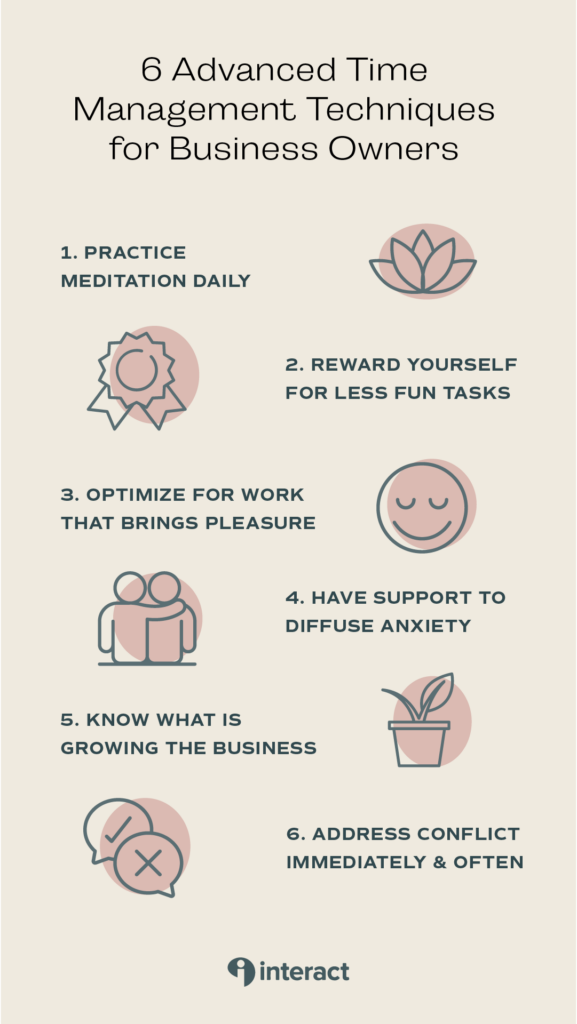
The life of a founder/business owner is non-stop. Their business responsibility can overwhelm them to the point of debilitation, even when not involved in projects
However, some people have managed to live with the constant pressure and demands while still producing, creating, and building at incredible rates without burning themselves out.
This is a story about those people and what we can learn from them.

1. Practice meditation daily: Marcus Aurelius
I told you that this list was advanced in the title; no easy stuff here. The benefits of meditation are nearly unlimited. One of the benefits is the ability to remain focused and stay present. Staying present is a huge win for time management because, usually, when we lose track of time, we’re either worried about the future or obsessing over the past.
Emperor Marcus Aurelias, whose list of accolades and accomplishments is much too long for this article, was very aware of this. He said, “Staying present reminds you that whatever may come in the future, you will have the same tools at your disposal you have now.”
Marcus’s journal entries are available for free through MIT. Super dry reading (imagine reading someone’s daily journal) but worth pursuing if for no reason other than realizing that meditation is an invaluable skill and has been for a long time.
2. Reward yourself for completing less fun tasks: James Clear
Do you ever feel like time management and productivity advice hinges around forcing yourself to do more and more? Like, where is the fun in any of this? That’s where James Clear pops in with advice in his book Atomic Habits. He recommends a system where people reward themselves for tasks that are harder to motivate for.
For example, meditation is hard. You can reward yourself by meditating before your first cup of coffee in the morning. Your brain will start to associate meditation with the coffee that wakes you up and feels nice. The two become associated, and so meditating won’t feel as hard.
3. Optimize for work that brings pleasure: Confucius
“To study and at due times practice what one has studied, is this not a pleasure?”
–The Analects of Confucius
Confucius’s opening line hits home. Aren’t we all in our businesses because we genuinely enjoy what we learn and teach at one level or another?
The simple pleasure of acquiring knowledge and sharing it is enough to sustain us through the less-desirable tasks we inevitably face as business owners.
Though we can’t eliminate disliked business aspects, focusing on what we love can provide a boost.
When looking at your business as a whole, build a consistent practice of delegating parts that don’t bring you energy. Make more space for the things that give you life. If you do, you’ll enjoy your work for the long haul rather than get bogged down by all the parts you dislike.
4. Have a support network to help diffuse anxiety: Maya Angelou
“Alone, all alone. Nobody, but nobody. Can make it out here alone.”
—Maya Angelou
Building a company can be isolating. So much has been written about the mental health of founders. One antidote, though, is to build a network of people who can help diffuse your anxiety when you get overwhelmed.
I recently had a conversation with another business owner, and we both shared that we tend to think in black and white. We’re either elated about how great things are going, or we’re ready to throw in the towel and do something else. In the book The Hard Thing About Hard Things, internet pioneer Ben Horowitz shares that founders often undulate between absolute elation and crippling fear.
It’s one thing to go through the ups and downs alone, and, frankly, there’s never a good time to go that route. But when you have people you can talk to, it can help regulate the emotional toll.
According to a UCLA study, “Emotion regulation is more effective when other people actively help us with it.” For example, simply hearing someone else’s perspective on your situation can help to calm you down.
To remain effective and work through problems, it’s best to be calm—neither too high nor too low. Being with people we trust can help us stay in this zone and get things done during the ups and downs.
5. Know what is growing your business: John Doerr
The ability to quickly say “no” is crucial if you want to manage your time effectively. Business owners face numerous distractions every single day. Limited time for focused work impacts outcomes significantly; how we use it matters greatly.
But, the only way to improve is to know what truly works in your business. It can be tough to track everything—especially when you’re getting started—but, for example, even something as simple as using UTM parameters on every marketing campaign can provide great insight into where your customers come from.
In his book Measure What Matters, John Doerr speaks of the importance of Objective Key Results (OKRs), goals set within a company at every level. He recommends OKRs for everyone on the team, including the business owner. Significant research shows that having strong goals leads to more results and a better ability to manage time.
When facing new ideas or problems, evaluate their relevance and impact on business growth potential. Then you can quickly decide if it’s worth your time.
6. Address conflict immediately and often: Patrick Lencioni
In his leadership book Death by Meeting, Patrick Lencioni tells the story of a company that completely erodes because a conflict within the team goes unaddressed. It’s a fable, which means it’s meant to be extreme, but the story resonates with many business owners who have seen internal conflict tear apart their teams and mental fortitude.
The best way to handle conflict? Address it head-on and often. There will be constant conflict within any good team, which can be a positive thing. In his book Shoe Dog, Nike founder Phil Knight reveals that his original team would argue for hours and hours, getting into heated debates about every single decision. These constant conflicts led to massive innovation and took Nike from a fledgling startup to become one of the world’s biggest companies. So, while conflict is great, it still must be addressed and resolved. Your ability to focus is only as strong as your ability to resolve conflict and restore peace.
Conclusion: Experiment with your time management flow
The above examples show that there’s no one way to best handle time management. Everyone has a different approach and opinions about optimizing time. The connection is that we all need to find what works for us and our businesses. What works for you won’t be the same as what works for everyone else because we’re all different.
My best advice: peruse these tips, read the books linked, learn from others, and slowly build your time management skills by experimenting with different routines until you find what works best for you.